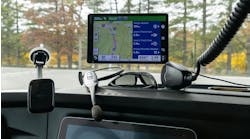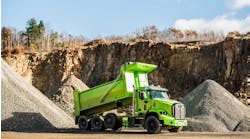FleetOwner has covered ways trucking fleets are using artificial intelligence today. Some are taking advantage of their telematics providers’ AI capabilities, like how Western Express relies on Motive to sift through its dashcam footage using AI. Others are taking advantage of in-house expertise and building their own AI models, such as Gulf Relay’s shipper communication optimization.
But even fleets that don’t have the manpower or expertise to develop their own solutions can benefit from AI another way—by using AI agents.
Rectangle, a company that specializes in building AI agents for transportation, wants to change the way trucking companies think about executing and operating freight, Matt Salefski, co-founder and CEO, said.
“Twenty years ago, Amazon introduced one-click checkout, and it really forced people to rethink how e-commerce works,” Salefski said. “We want to take that same approach.”
See also: How AI could streamline your trucking operations in 2025
What is an AI agent?
AI agents are large language models with unique capabilities: they can use advanced software interactions and autonomous decision-making to perform more complex tasks. Like traditional LLMs, AI agents have only limited reasoning abilities—but they can interact with backend software "to obtain up-to-date information, optimize workflow, and create subtasks autonomously to achieve complex goals," according to IBM.
“Think of [AI agents] just like a human that does a job, for example, when a shipment is delivered, and I have to upload a [proof of delivery] into our shipper system,” Salefski said. “The way we do that is by using the same tools that a human uses, except we can automate those tools that a human uses.”
Fleets can take advantage of AI agents designed specifically for the trucking industry.
Building an AI agent for a fleet is simple, Salefski said. It starts with an introduction call with Rectangle to allow the company access to the fleet’s web-based systems and gives the fleet owner or manager the opportunity to outline the tasks they want to automate.
After the agent is built, Rectangle gives the fleet administrator access to a platform that shows what Rectangle’s AI agent is doing on behalf of the fleet, whether that’s automating delivery documents or assigning loads.
Further, the AI agent can evolve from conducting simple tasks for more difficult tasks, depending on how it’s “trained.” Salefski said the best way to think of this training is to imagine the AI agent as an employee.
“When you're training a new employee, you tell them exactly how to do the task. You may write it down, you may have a standard operating procedure, and then they go back and do it,” Salefski said. “Our platform, the long-term vision, is that [fleets] can just tell us with words exactly how it should work, and then our system will automatically write the code to make it work like that. ... We work with you to help configure [the AI agent] so that it works for you, and you get the most out of it.”
What fleets benefit from AI agents?
Fleets that benefit most from AI agents are those whose employees have high task counts.
“If you have an operations team that is manually doing a bunch of data entry, I think that’s one indication” that a fleet could benefit from an AI agent, Salefski said. Fleets that conduct business across country borders that require cross-border documentation and other manual functions might also benefit from an AI agent.
Being a good candidate for an AI agent is less about the size of the fleet and more about the “tasks” that the fleet can automate, Salefski said. For example, a fleet that runs primarily long-haul full truckload routes might have fewer tasks than a fleet that runs primarily local due to the increased number of pickups and drop-offs in a shorter amount of time.
Salefski said Rectangle’s customers span the gamut from first-mile and drayage to last-mile deliveries.
One of Rectangle’s customers working in drayage relies on its AI agent regularly for its data needs with ports and terminals, customs, their customers, their customers’ customers, and more. “All of that information needs to be manually entered or retrieved from a bunch of different data sources,” Salefski explained.
This Rectangle customer services one shipper who requires timely milestone updates on its shipments. When the carrier adds shipment data to its TMS, Rectangle’s AI agent automatically adds that information to the shipper’s portal.
“That customer also doesn't just care about the presence of the data but the timeliness of it as well,” Salefski said. “Previously, every hour or so, [the carrier] would update their customer’s portal; now, it’s all in real-time.”
See also: How AI is making fleets more efficient
Currently, there is “a lot of noise surrounding AI,” as Salefski put it, but he encourages fleets not to implement any new technology too quickly. While his customers have seen value from AI—requesting to implement it “more and more” within their operation—Salefski recommends logistic companies develop a change management process to ensure a smooth transition process for their employees.




